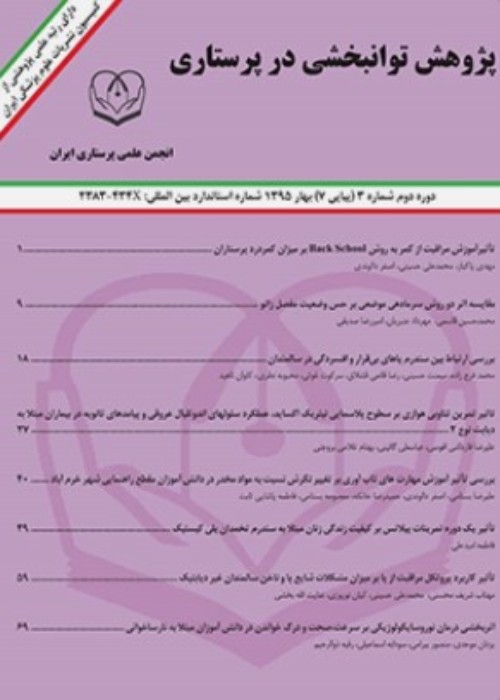The effect of empowering family caregivers of brain damaged patients base on problem solving by telephone follow-ups on knowledge, attitude and skills of caregiving
Author(s):
Abstract:
Introduction
Complications of brain damage are one of very important issue and a potential barrier to the optimal recovery of these patients. Hospital based training of family caregivers have not been able to solve the various problems of the patients and their families. The goal of this research is to determine the effect of empowering family caregivers of brain damaged patients base on problem solving by telephone follow-ups on knowledge, attitude and skills of caregiving.Methods
This study is a randomized clinical trial with a control group. Sixty caregivers of brain damaged patients were selected by convenience sampling and were randomly allocated to experimental (30 people) and control group (30 people). In the control group routine care was provided to patients until their discharge from hospital. In the experimental group a training program for family caregivers based on problem solving at the patient's bedside was initiated and after discharge from hospital they were followed up by telephone for 8 weeks. Data collecting tools in this study was a researcher-made questionnaire including information on demographic factors, awareness, understanding and skills of caregiver. The validity of the questionnaire was checked and confirmed by experts and the reliability of it was examined and confirmed by Cronbach's alpha. This questionnaire was filled out by caregivers before and after the research. Then the data were analysed with SPSS V.16 by independent Mann-Whitney T test and Wilcoxon's matched pairs T test by repeating measurement.Results
Based on independent T-test there wasnt a significant difference among means of scores of awareness, understanding and skills of control group and experimental group before introducing interference (P>0.05). But the numbers resulted from two months interference was significant (P0.05).Conclusion
Training in releasing period based on problem solving by telephoning follow-ups leads to increasing awareness, understanding and skills of brain damaged caregivers and will help them in different caregiving jobs. It will lead to improving the role of caregivers and health condition of the patient. We can recommend it as a substituting method when there is no social nursing present in Iran.Keywords:
Language:
Persian
Published:
Iranian Journal of Rehabilitation Research in Nursing, Volume:1 Issue: 2, 2015
Pages:
10 to 21
magiran.com/p1698914
دانلود و مطالعه متن این مقاله با یکی از روشهای زیر امکان پذیر است:
اشتراک شخصی
با عضویت و پرداخت آنلاین حق اشتراک یکساله به مبلغ 1,390,000ريال میتوانید 70 عنوان مطلب دانلود کنید!
اشتراک سازمانی
به کتابخانه دانشگاه یا محل کار خود پیشنهاد کنید تا اشتراک سازمانی این پایگاه را برای دسترسی نامحدود همه کاربران به متن مطالب تهیه نمایند!
توجه!
- حق عضویت دریافتی صرف حمایت از نشریات عضو و نگهداری، تکمیل و توسعه مگیران میشود.
- پرداخت حق اشتراک و دانلود مقالات اجازه بازنشر آن در سایر رسانههای چاپی و دیجیتال را به کاربر نمیدهد.
In order to view content subscription is required
Personal subscription
Subscribe magiran.com for 70 € euros via PayPal and download 70 articles during a year.
Organization subscription
Please contact us to subscribe your university or library for unlimited access!



